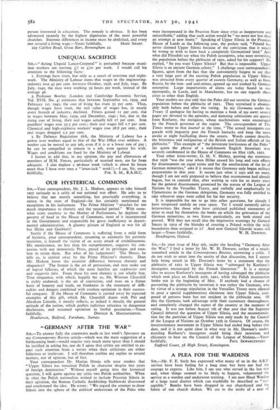" GERMANY AFTER THE WAR"
StR,—To answer fully the comments made in last week's Spectator on my Contemporary Review article—which was the mere suggestion of a forthcoming book—would require very much more space than I should be justified in asking for, nor do I agree that critics are entitled to ex- pect such attention from a writer when their criticisms are either fallacious or irrelevant. I will therefore confine my replies to several matters, not of opinion, but of fact.
Your correspondent Dr. Marian Ostoja tells your readers that " Upper Silesia has remained Polish in character despite 600 years of foreign domination." Without myself going into the historical question, I will quote against my critic two Polish authorities. When in 1892 the Polish nationalists wished to include Prussian Silesia in their agitation, the Roman Catholic Archbishop Stablewski disavowed and condemned the idea. He wrote: " We regard the attempt to draw Silesia into the sphere of the political endeavours of the Poles who were incorporated in the Prussian State since 1722 as inopportune and unjustifiable," adding that such action would be-" no more nor less than an attempt at new booty." Speaking of Upper Silesia in the Prussian House of Lords in the following year, the prelate said, " Poland has never claimed Upper Silesia because of the conviction that it would be wrong to wish to have back a completely Germanised land." And what did Pilsudski say when the Polish insurgents, who were terrorising the population before the plebiscite of 1921, asked for his support? He replied, " So you want Upper Silesia? But that is impossible. Upper Silesia is an ancient German colony." I challenge your correspondent's figures, apart from the fact that she conveniently forgets to say that a very large part of the existing Polish population in Upper Silesia was attracted from every quarter of eastern Germany, as well as from Russia, by the iron- and coal-mines, opened up and worked by German enterprise. Large importations of aliens are today found in our metropolis, in Leeds, and in Manchester, but no one regards these cities as other than English.
Your readers are also told that the Poles did not terrorise the German population before the plebiscite of 1921. They terrorised it abomin- ably both before and after the voting. In my Germany under the Treaty (I apologise for having to mention a book of my own) several pages are devoted to the episodes, and damning admissions are quoted from Korfanty, the instigator, whose machinations were encouraged by the French governor of the region. The correspondent of The Times wrote to that journal at the time, " The armed insurgents can parade with impunity past the French barracks and keep the town awake at night fusillading down the streets. Words cannot describe the bitterness and indignation of the British and Italian officials of the plebiscite." This example of " the inveterate lawlessness of the Poles " (to quote, the phrase of a well-known English historian) was severely condemned in the House of Commons on May 13th, 1921.
Your other letter-writer, G. M. V. Hickey, quoting my statement that 1936 "was the year when Hitler ceased his long and vain efforts for disarmament on equal terms and for the amelioration of the lot of German minorities," asks if it means that Germany only began military preparations in that year. It means just what it says and no more, though I am not only prepared to believe that rearmament had already begun, but to contend that, after waiting in vain for so many years for the general disarmament promised by the statute of the League of Nations by the Versailles Treaty, and verbally and emphatically by Clemenceau to the German delegation, Germany was fully entitled to take whatever steps were called for for her security.
It is impossible for me to go into other questions, for already I have trespassed unduly on your space. Yet I would earnestly advise letterweiters like those who have criticised published statements of mine to read for themselves the books on which the grievances of the German minorities, in two States particularly, are both stated and proved. Will they not recall also the impressive warnings by General Smuts in 1919 of the blunder of creating a Poland within the wide boundaries then assigned to it? And now General Sikorski wants still






























 Previous page
Previous page